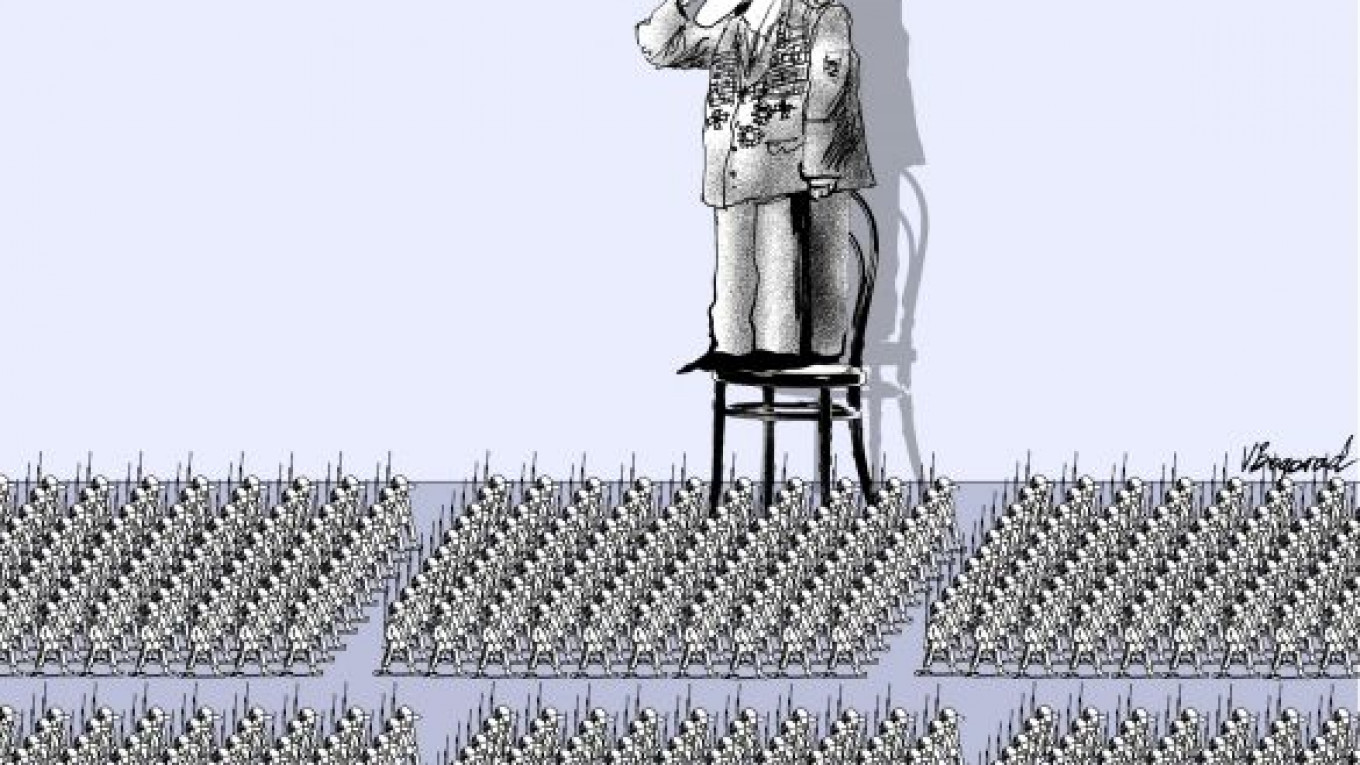Every year in October, as the cold, damp weather sets in, it is time for the fall call-up of new draftees.
The goal is to conscript 278,000 young men by Dec. 31, but this year the army is supposed to institute new humanitarian measures to make the one-year mandatory service more civilized. For example, parents can attend draft board sessions and are allowed to accompany the future soldiers right up to their assigned units — a time in which many violations have traditionally occurred. In addition, conscripts can now have mobile phones to stay in contact with relatives and friends — or to report misconduct — and efforts will be made for them to serve relatively close to home. It is also expected that for the first time ever soldiers will be given weekends off.
The idea is to transform the current prison-like conditions in the military to something similar to a “sports camp,” loosely speaking. That is wonderful news, of course. Unfortunately, it will have little bearing on the combat readiness of the armed forces for two reasons. First, the Defense Ministry has rejected the 21st-century military model of building a compact, highly skilled professional force. Second, since the draft occurs twice a year — fall and spring — and conscript service has been reduced to one year, this means that the most experienced conscripts at any time have a maximum of only six months service under their belt — barely enough time to complete basic training. The result is clear — a woefully low level of combat readiness, particularly when modern battles require advanced training in communications and high-tech weapon systems.
Humanization is a much-needed measure, of course, but the efficiency and battle-readiness of the armed forces will never improve if this is not accompanied by modernization of the armed forces and a fundamental understanding of how 21st-century battles are fought.
I have repeatedly asked those who defend the draft why a conscript army is necessary when the country no longer plans to call up millions of reservists in time of war. It is clear that the huge reserve of low-skilled recruits is kept as cannon fodder in the event of a war.
In any debate about conscription, the defenders of the draft inevitably point to the need to have a million-man army. This number of 1 million has taken on an almost mystical significance. For the past decade, every military and political leader warns that as soon as the army drops down below a million soldiers, Russia’s ability to defend itself will be weakened considerably. The most common — and least convincing — explanation is that Russia has a huge territory that requires a least a million soldiers to defend its borders. In reality, though, only much smaller, high-skilled rapid deployment forces can guarantee Russia’s protection. Heavy-weapon depots should be established in areas where potential military threats are the greatest, and combat-ready forces should be deployed rapidly to those locations if a threat materializes.
Russia’s defense strategies are still stuck in the Napoleon age when “big battalions” decided not only who was right, but who was victorious. Fast-forward 200 years to the U.S. invasion of Iraq in 2003. The 400,000-member Iraqi army was destroyed by only three divisions: two U.S. and one British. Those battles were won by the use of advanced surveillance and communication equipment to identify enemy troop movements, coupled with highly accurate weapons for destroying those forces.
Russia’s army is still crippled by the fundamentally flawed and outdated military mindset of its leaders who confuse quality with quantity. This explains why the top brass so desperately wants to have an army numerically equal to that of North Korea’s — a country of 24 million people that has an army of 1.1 million active personnel.
But unlike North Korea, Russia can’t possibly reach the magical 1 million number it is so obsessed with. There are two reasons for this. The first and most important reason is that the acute demographic decline has resulted in a sharp drop in the number of young men reaching 18 years of age — to 800,000. The second reason is that widespread corruption allows thousands of eligible conscripts to receive exemption from service.
As a result of these two factors, the twice-a year call-ups are only able to conscript 564,000 soldiers. Add 150,000 officers and the 100,000 remaining contract soldiers to that number, and you get a little more than 800,000 active military personnel. Nonetheless, Russia’s military leaders still dream day and night of building a million-man army, dooming the armed forces to North Korea’s level of combat readiness.
Alexander Golts is deputy editor of the online newspaper Yezhednevny Zhurnal.
A Message from The Moscow Times:
Dear readers,
We are facing unprecedented challenges. Russia's Prosecutor General's Office has designated The Moscow Times as an "undesirable" organization, criminalizing our work and putting our staff at risk of prosecution. This follows our earlier unjust labeling as a "foreign agent."
These actions are direct attempts to silence independent journalism in Russia. The authorities claim our work "discredits the decisions of the Russian leadership." We see things differently: we strive to provide accurate, unbiased reporting on Russia.
We, the journalists of The Moscow Times, refuse to be silenced. But to continue our work, we need your help.
Your support, no matter how small, makes a world of difference. If you can, please support us monthly starting from just $2. It's quick to set up, and every contribution makes a significant impact.
By supporting The Moscow Times, you're defending open, independent journalism in the face of repression. Thank you for standing with us.
Remind me later.







